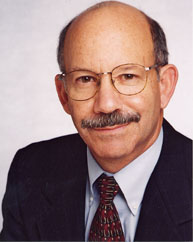What's the world coming to? Earlier today, I thanked God (only a little ironically) for Al Gore, and now I'm agreeing with Rep. Peter DeFazio.
 The U.S. Representative from Springfield, Oregon, came out quickly today with a statement of outrage about the U.S. Supreme Court's Kelo decision.
The U.S. Representative from Springfield, Oregon, came out quickly today with a statement of outrage about the U.S. Supreme Court's Kelo decision."I am shocked by the ruling today from what I thought was a relatively conservative Supreme Court. It allows a broad intrusion of local government and violates the constitutional rights of Americans. This could also have alarming implications for local elections as corporate developers will most certainly seek out candidates eager to condemn private property for economic development. I plan to find a remedy in Congress, to address this egregious ruling which includes the possibility of a Constitutional amendment."
Rep. DeFazio was shocked about the ruling from the "relatively conservative Supreme Court," but he may be as surprised as I am to find himself making common cause with the conservative end of it -- Justices Rehnquist, Scalia and Thomas, along with iffy Justice O'Connor who wrote the dissent to which the others signed on -- and shocked and outraged at the decision of the liberal end of the Court -- Justice Stevens, who wrote the opinion, along with Justices Souter, Ginsburg, Breyer and Kennedy.
What happened was that the town of New London, Conn., decided that it could build a pharmaceuticals plant and some chichi developments on a piece of property. Everybody sold out except a couple of homeowners who liked their homes very much -- one was born in hers, which was built in 1895, and the other moved into her dream house in 1997 -- and didn't want to move out of the way for chichi development.
Tough sh*t, writes Justice Stevens in the winning opinion. It's not OK for the city to take land from one party and give it to another, but this isn't like that. This is more like taking land from one party and giving it to the railroads or like taking it away from one party and giving it to another party that the city chooses, because the city thinks it's a really, really good idea.
Some people are arguing that this case will open the possibility for the government to take property away from one party and give it to another party that will pay more taxes. Nonsense, writes Justice Stevens, because we'll cross that bridge when we come to it.
Some people argue that governments come up with nitwit ideas that don't really work. We don't want to hear about it, writes Justice Stevens, because the Court can't be bothered with determining whether something is a nitwit idea or not.
If you've got a problem with this, the Justice writes, go to your state constitution.
Dissenting, Justice O'Connor points out that the New London Development Corporation, which will acquire the land, is a private, nonprofit group, whose directors are not elected, but privately appointed. "But were the political branches the sole arbiters of the public-private distinction, the Public Use Clause would amount to little more than hortatory fluff," she writes, pithily.
She and her fellow dissenters get the downstream danger:
For who among us can say she already makes the most productive or attractive possible use of her property? The specter of condemnation hangs over all property. Nothing is to prevent the State from replacing any Motel 6 with a Ritz-Carlton, any home with a shopping mall, or any farm with a factory.To Justice Stevens' suggestion that dissatisfied property owners turn to the states for help, she says, "States play many important functions in our system of dual sovereignty, but compensating for our refusal to enforce properly the Federal Constitution (and a provision meant to curtail state action, no less) is not among them."
DeFazio was quoted saying that he was willing to try to get a Constitutional amendment passed. I'm onboard with that, but it's ironic that the Court can find a right to abortion hidden in the emanations of the penumbra of the bill of right, and the majority can't find a right not to have property taken away and given to someone else when the minority finds it in the text of the Constitution. Justice Thomas can still discern meaning from a text:
When faced with a clash of constitutional principle and a line of unreasoned cases wholly divorced from the text, history, and structure of our founding document, we should not hesitate to resolve the tension in favor of the Constitution's original meaning.I'll confess to seeing one bright spot in the midst of this. I've written a novel -- written it several times in fact -- set in the near future. One character reports that the city bulldozed a church for a shopping center (it's backstory for the plot). I've had people tell me that it's all just too farfetched. I'm still working on it, but to all those agents and editors out there, I'd like to say just one thing: I told you so.
UPDATE: Dennis Sevakis observes that once again Justice Stephen Breyer is following Zimbabwe's lead in human rights.
UPDATE: The Wall Street Journal has a much more coherent critique than mine.
UPDATE: And in Fort Wayne, Ind., when a family rejected the city's low-ball offer for a seizure of land to build a sewer line, the city refused to pay anything at all.
A version of this post is also available at Blogger News Network.
UPDATE: Reason online interviews one of the plaintiffs' attorneys.
UPDATE: More from Jeff Jacoby.

No comments:
Post a Comment